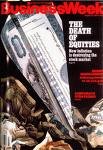The headline for a story in Bloomberg this morning here. The bottom line of the story is that retirement calculators may be overestimating expected portfolio returns, based on projections by Research Affiliates (stocks 5-6%, bonds 2%), Jack Bogle (stocks 7 – 7.5%, bonds 3%) and T Rowe Price (balanced portfolio 7%). The calculators use historical returns, which are higher. It then goes on to discuss various online retirement calculators.
It does highlight the importance of low expense ratios in low return scenarios. There is no mention of inflation, a serious shortcoming. There is also no mention of Firecalc, an egregious error.
I do wonder about projections of future returns. Even when they may be well founded and based on sound methodology, they do not account for volatility. Rebalancing portfolios after significant price changes can lead to higher total return compared with buy and hold, which is assumed but not mentioned in article (and most calculators).
It does highlight the importance of low expense ratios in low return scenarios. There is no mention of inflation, a serious shortcoming. There is also no mention of Firecalc, an egregious error.
I do wonder about projections of future returns. Even when they may be well founded and based on sound methodology, they do not account for volatility. Rebalancing portfolios after significant price changes can lead to higher total return compared with buy and hold, which is assumed but not mentioned in article (and most calculators).



 ) that is more than conservative.
) that is more than conservative.
